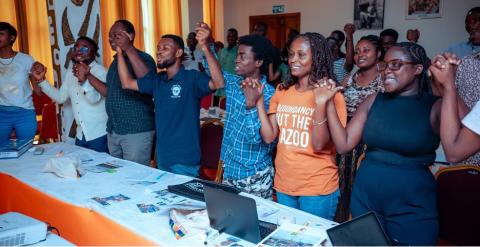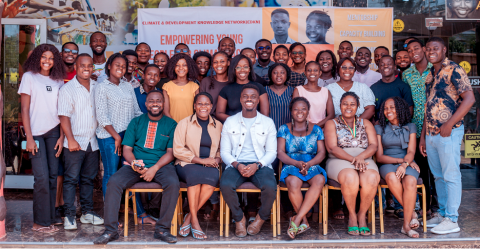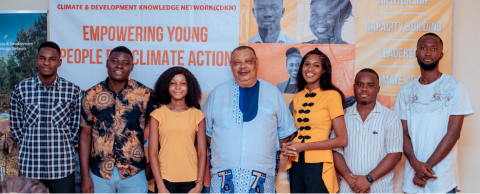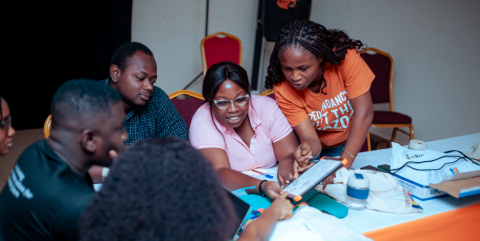CDKN Ghana implements Climate Activists Programme to empower young people to take climate action
CDKN Ghana implements Climate Activists Programme to empower young people to take climate action
In an effort to enhance the capacity of young people to lead local-level climate solutions that reflect climate action being taken at the national level, the CDKN Ghana programme implemented the Climate Activists Programme (CAP), a six-week learning and skills building initiative centred on climate activism and eco-entrepreneurship across the country. The programme was initiated with an open call which attracted over 100 applications from the 16 regions in Ghana. Forty candidates, aged 18 to 35 years old, were selected based on regional representation, gender equality and the level of opportunities they had received in the past. These criteria were put in place to ensure that young leaders from marginalised and less privileged backgrounds could be given the opportunity to participate in climate change conversations at a national level.

The initiative included five weeks of online training and a week-long in-person workshop that focused on design thinking, project management, personal branding and knowledge brokering. The comprehensive approach used in designing the programme ensured that participants were empowered with evidence-based knowledge about climate-related risks within their communities, and practical skills and tools that they can use to develop innovative solutions for action. This approach is at the core of CDKN Ghana’s country strategy, which aims to enhance the capacity of marginalised groups, especially young people and women, to lead the implementation of Ghana’s climate change policies and strategies including the National Adaptation Plan (NAP).
CAP leveraged the expertise of experienced officials from key institutions including the Environmental Protection Agency (EPA), University of Ghana, the Multimedia Group, Youth Climate Council (YCC) Ghana, Strategic Youth Network for Development (SYND) and seasoned private consultants who served as mentors for the 40 young participants and provided facilitation assistance throughout the sessions. The mentoring sessions provided opportunities for learning, team building and skills sharing, enabling participants to develop projects they could effectively implement within their communities. Some of the projects designed by various teams during the six-week programme included: an advocacy for clean cooking technology that prevents deforestation from charcoal production; an art exhibition and an auction to promote climate literacy; and a toolkit for learners and teachers for waste and environmental management.
One of the mentors and facilitators, Richard Martey from YCC Ghana, praised the innovative solutions presented by the trainees, saying "Mentoring these young individuals and learning from their creative approaches was a rewarding experience. It's essential for civil society organisations to create more platforms like this to empower young people and marginalised groups to adapt to the climate crisis."

Gabriel Domoninge Naa (Participant and CDKN Ghana Climate Change Awareness Challenge Awardee, Ashesi University) shared how he has used the training sessions to develop his skills as an activist and an entrepreneur. He says, "This programme has enhanced my approach to communicating climate change and providing climate-smart solutions. The training honed my skills, which I can apply in my engineering projects". He adds that the training on climate science shaped his approach to the development of a mobile application tool he is currently working on to connect local farmers to rapid extension services. He intends to include an audio translation of basic contextual climate information in the local language (‘Dagaare’) to enhance climate literacy at the community level.
Ernest Mensah, a CDKN Ghana Ecopreneur fellow, whose innovation focuses on developing insect-based products for the local agricultural, livestock and biotech industries using organic solid waste, also reflected on the skills the programme gave him as an entrepreneur. Ernest believes that the training on project management and design thinking will enhance his capacity to manage his team and engage local people efficiently to actively drive ongoing climate solutions in his community.
Reflecting on the CAP, Prof. Chris Gordon, Country Advisor to CDKN Ghana, emphasised the opportunities that climate change presents for young people. He said, "Climate change offers a unique chance for young people to take action and create employment opportunities for themselves." He highlighted CDKN's commitment to empowering youth to address the challenges of climate change at the local, national, and global levels, ensuring they are equipped with practical skills rather than just theoretical knowledge.

Lessons from CAP implementation
- Comprehensive training approach: Combining online and in-person learning with a diverse curriculum that includes climate science, policy landscape, strategic communication, project management, design thinking and building online tools equips participants with both theoretical knowledge and the practical skills needed to take action. This comprehensive approach helps young people understand the context of local climate impacts and develop innovative, community-specific solutions.
- Mentorship and collaboration: Engaging with experts and mentors provides valuable insights and professional guidance for young people who aspire to take the opportunities within the climate change space. This collaborative environment also facilitates team building, skills sharing and continuous support, empowering young people to lead and advocate for climate action in their communities.
- Inclusivity and empowerment: Focusing on marginalised groups and ensuring their participation in climate initiatives promotes comprehensive and inclusive action. Peer-led dialogues and youth-driven initiatives can inspire long-term engagement, leadership, and the development of employment opportunities within the climate action field.

CAP set out to equip a group of 40 young people from across Ghana with the skills and knowledge needed to address climate risks and create solutions to climate-related challenges.The programme has empowered this group of participants to take action and become leaders, advocates and entrepreneurs within their communities. Their positive response to the programme demonstrates a strong desire among young people for mentorship and leadership training that is inclusive and solutions-oriented, and that builds on both their own enthusiasm and the experiences of the older generation to create meaningful change and a sustainable future.
For more information about future training sessions, testimonials and how to get involved, visit CDKN Ghana's linktree to access all our online platforms and engage with us.
